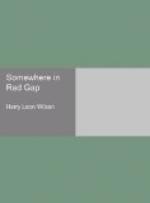My candle had just been extinguished when three closely fired shots cracked the vast stillness of the night. Ensued vocal explosions of a curdling shrillness from the back of the house. One instantly knew them to be indignant and Chinese. Caucasian ears gathered this much. I looked from an open window as the impassioned cries came nearer. The lucent moon of the mountains flooded that side of the house, and starkly into its light from round the nearest corner struggled Lew Wee, the Chinaman. He shone refulgent, being yet in the white or full-dress uniform of his calling.
In one hand he held the best gun of Jimmie Time; in the other—there seemed to be a well-gripped connection with the slack of a buckskin shirt—writhed the alleged real doughnuts of a possibly Peruvian character. The captor looked aloft and remained vocal, waving the gun, waving Jimmie Time, playing them together as cymbals, never loosening them. It was fine. It filled the eye and appeased the deepest longings of the ear.
Then from a neighbouring window projected the heroic head and shoulders of my hostess, and there boomed into the already vivacious libretto a passionate barytone, or thereabout, of sterling timbre.
“What in the name of—”
I leave it there. To do so is not only kind but necessary. The most indulgent censor that ever guarded the columns of a print intended for young and old about the evening lamp would swiftly delete from this invocation, if not the name of Deity itself, at least the greater number of the attributes with which she endowed it. A few were conventional enough, but they served only to accentuate others that were too hastily selected in the heat of this crisis. Enough to say that the lady overbore by sheer mass of tone production the strident soprano of Lew Wee, controlling it at length to a lucid disclosure of his grievance.
From the doorway of his kitchen, inoffensively proffering a final cigarette to the radiant night, he had been the target of three shots with intent to kill. He submitted the weapon. He submitted the writhing assassin.
“I catch ’um!” he said effectively, and rested his case.
“Now—I aimed over his head.” It was Jimmie Time alias Little Sure Shot, and he whimpered the words. “I jest went to play a sell on him.”
The voice of the judge boomed wrathfully on this:
“You darned pestering mischief, you! Ain’t I forbid you time and again ever to load them guns? Where’d you get the ca’tridges?”
“Now—I found ’em,” pleaded the bad man. “I did so; I found ’em.”
“Cooned ’em, you mean!” thundered the judge. “You cooned ’em from Buck or Sandy. Don’t tell me, you young reprobate!”
“He all like bad man,” submitted the prosecution. “I tell ’um catch stlovewood; he tell ’um me: ‘You go to haitch!’ I tell ’um: ’You ownself go to haitch! He say: ‘I flan you my gun plitty soon!’ He do.”




